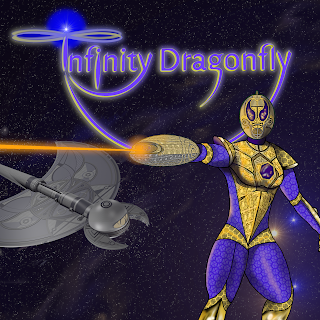Review: LaGuardia
Written by Nnedi Okorafor, award-winning Nigerian-American writer of Marvel's Shuri: Search for Black Panther, LaGuardia is a tale of identity, migration, segregation, integration, love and family.
At some point in the near future extraterrestrials make contact with Earth, the first spacecraft landing just off the coast of Nigeria. Lagos becomes an interstellar focal point, the first port of call for vistors from other worlds...
Of which there are many! Artist Tana Ford takes delight in creating a diverse bestiary of aliens, imaginatively non-humanoid; weird, wonderful, bizarre, grotesque, cute and fascinating. This includes alien plants, some of which are a lot more mobile than most Earth varieties.
Dr Future Nwafor Chukwuebuka, who specialises in alien medicine, leaves Lagos suddenly, without a word to her husband Citizen ... despite being pregnant with their child. Arriving at LaGuardia airport/spaceport in New York she is stopped by border control who are implementing restrictions on the immigration of aliens into the US, and want to be certain that her unborn child is indeed human.
By focussing on this, they fail to spot that she is actually smuggling an alien plant into the country, one capable of speech...
This is a fun story that plays with issues of race, identity, culture and what it means to truly cross boundaries from one's own familiar world into one that is foreign, dangerous and threatening. In this reality Africa is the melting pot of alien and human societies: humans even receive organ and limb transplants from alien donors. The US is less accepting and even has hospitals in which extraterrestrials are not welcome. "HUMANS PREFERRED" says one sign, an uncomfortable reminder of another type of segregation in America, not so very long ago.
It is a not uncommon theme in science fiction for prejudice by humans against aliens to be used as a metaphorical commentary for race. The concept of how we regard those who look different to us, yet have the same feelings, thoughts, hopes and dreams, is expanded beyond our Earth-bound experiences. Humans are one species, but if we encounter sentient, sapient beings from other worlds who have the same abilities of reasoning and emotion, do we have justification for treating them with disdain just because their anatomy, physiology and DNA is different to ours? Or would that be just a new type of racism? Octavia E. Butler explores these themes in her Xenogenesis trilogy, highly recommended reading.
Future flees to the sanctuary of her grandmother, an enlightened matriarch who has many alien friends. She often has them round for coffee; a houseguest is a houseguest, purple tentacles notwithstanding. Tensions rise as a travel ban is proposed that would exclude anyone from a country with large alien populations from entering the US.
Meanwhile, back home in Lagos, Future's husband Citizen has to deal not only with the mystery of his wife's sudden disappearance but also the rise of Biafran separatists. As a member of the Igbo minority he falls under suspicion from the majority Yoruba authorities.
Humanity seems to be inherently xenophobic... is there any hope for peaceful co-existence?
Could a child of mixed parentage - human and alien - be the seed for a new era of unification?
Zak Webber
Twitter - @sfcomicartist / Instagram - @sfcomicartist
JOIN US ON FACEBOOK! - SCI-FI COMIC NEXUS
*****
***
*




Comments
Post a Comment